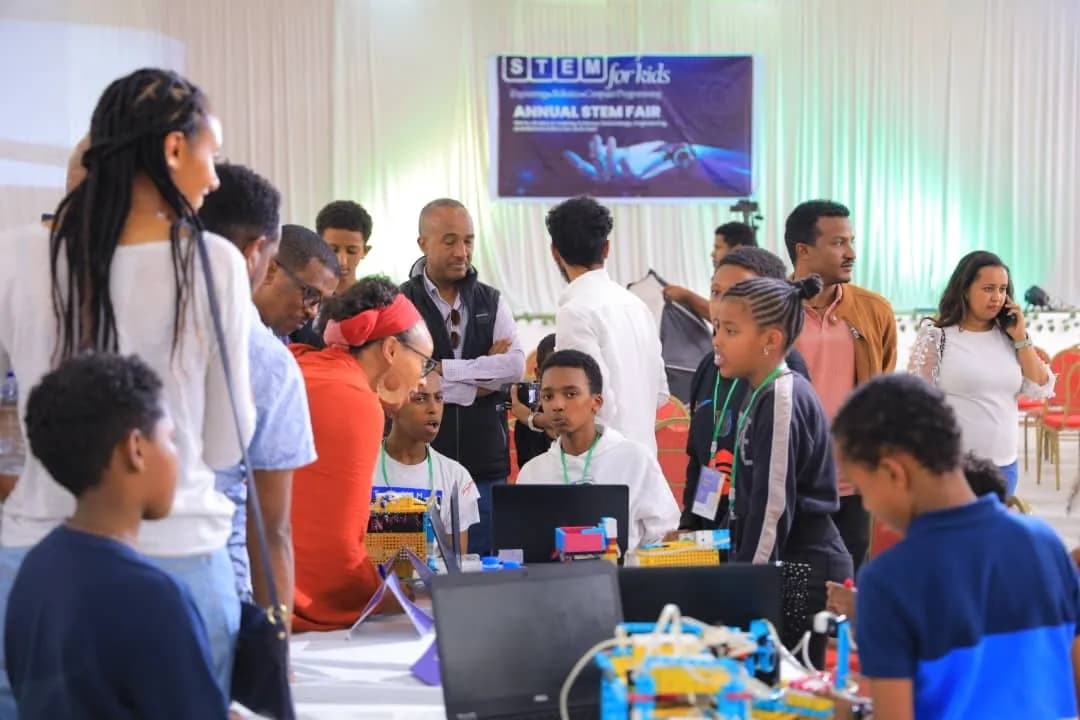Progress for 0 ad
Progress for 1 ad
Progress for 2 ad
Progress for 3 ad


Daniel Metaferiya
Addis Ababa, Ethiopia

As Ethiopia strives toward a more innovative and globally competitive standing, the lack of STEM (Science, Technology, Engineering, and Mathematics) skills remains a crippling handicap. More than just academic fancies, STEM skills are foundational for economic growth and the reduction of poverty in an increasingly digital world.
A local franchise of the U.S.-based STEM for Kids is equipping young Ethiopians with essential tech skills from robotics and coding to artificial intelligence (AI) and engineering. The private education enterprise has trained over 4,000 students between the ages of 4 and 17 across various tech disciplines.
"Most jobs today are becoming AI-assisted, and soon, many tasks will be machine-driven, says Ermias Hailemariam, Managing Director, STEM for Kids Ethiopia.” Our mission is to ask, what will the next generation work on and what should they be learning today.” he told Shega.
Ermias, a US Army veteran who owns the STEM For Kids franchise in Ethiopia, believes programming skills to as equally important to writing and reading competency in the contemporary world. He says they work to equip the students with more than just basic training on how to use technology, but rather the ability to “create with it”.
Ethiopia’s schools are woefully underequipped to provide the necessary education to arm students with up-to-date STEM skills. Even the most basic school supplies are missing across most schools, with one estimate by the World Bank suggesting that only 40% of them had computers. With the internet being a luxury of the few in rural regions, many students start their IT venture after finishing high school.
STEM for Kids trains students on problem-solving through coding, creative thinking through engineering, and real-world applications via robotics and AI. The sessions are conducted at the organization’s training centres, at schools after class hours, on weekends, and in special summer camps. Beginner courses at the organization start at around 4,600 Birr per month for three months, while private classes could cost as much as 63,400 Birr per month.
Last Saturday, the organization hosted its annual STEM Fair, where 30 students from various schools showcased their work with the most promising projects receiving an award.
Hafiz Ziyad, a 12-year-old from Berhan Ber Primary School, came to the Fair with a bold prototype for a smart parking system. Weaved from discarded cartons, plastic and a string of bulbs, his design flashes different colors depending on whether an obstacle is near the vehicle.
“I hope to see it used in the real world,” Hafiz says.
The organization aims to expand the training program outside of the capital by partnering with Ethio Telecom and Safaricom Ethiopia.
Simenew Keskes, Country Director for STEM Power Ethiopia, says a lot more can be done to realize some of the revolutionary ideas proposed by the students. He recalled that their centers have been giving out STEM courses over the past decade in a bid to bridge the skills gap.
“We have partnered with the AI institute and INSA recently,” Simenew told Shega.
👏
😂
❤️
😲
😠

Daniel Metaferiya
Daniel Metaferiya is a writer, journalist and radio host, with a keen interest in technology. He follows developments in Ethiopia's startup ecosystem closely and is passionate about profiling unique MSMEs.
Your Email Address Will Not Be Published. Required Fields Are Marked *